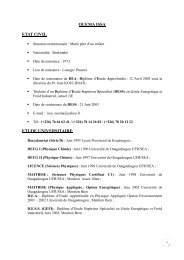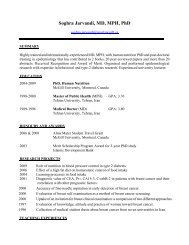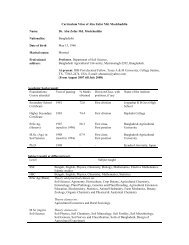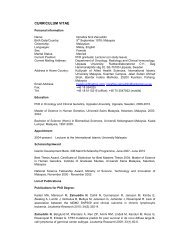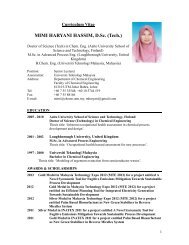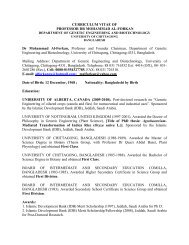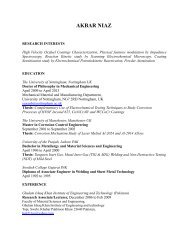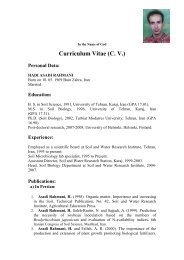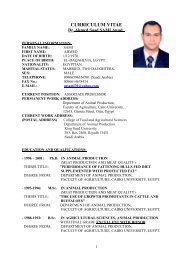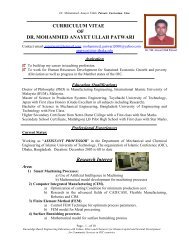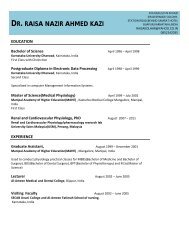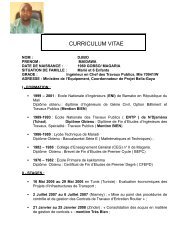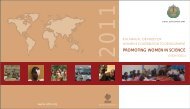Engineering: issues, challenges and opportunities for development ...
Engineering: issues, challenges and opportunities for development ...
Engineering: issues, challenges and opportunities for development ...
You also want an ePaper? Increase the reach of your titles
YUMPU automatically turns print PDFs into web optimized ePapers that Google loves.
ENGINEERING: ISSUES CHALLENGES AND OPPORTUNITIES FOR DEVELOPMENT<strong>Engineering</strong> policy, planning <strong>and</strong> management<strong>Engineering</strong> policy, planning <strong>and</strong> management, <strong>and</strong> associatedin<strong>for</strong>mation <strong>and</strong> indicators, are necessary to facilitate engineeringeducation <strong>and</strong> capacity-building, the <strong>development</strong> ofnetworks <strong>and</strong> partnerships, infrastructure, applications <strong>and</strong>innovation. Serious <strong>issues</strong> <strong>and</strong> <strong>challenges</strong> in this context relateto the fact that engineering is often be overlooked in the policycontext, as is engineering as part of the broader discussionof ‘science’. Although interest in science <strong>and</strong> technology studies<strong>and</strong> policy developed in the 1960s, the focus was mainly onscience <strong>and</strong> technology studies, policy <strong>and</strong> planning, with littlereference to engineering, <strong>and</strong> the study of engineering <strong>and</strong>engineering policy have remained a rather neglected area ofinterest <strong>and</strong> emphasis. At the same time, statistics <strong>and</strong> indicatorson science <strong>and</strong> engineering are aggregated in internationaldata gathering, which is of little use in the analysis of science orengineering, or of different branches of science <strong>and</strong> engineering.There is there<strong>for</strong>e an important need, <strong>and</strong> opportunity, todevelop the fields of engineering studies, engineering policy,planning <strong>and</strong> management, <strong>and</strong> to develop better statistics<strong>and</strong> indicators on engineering as an input to policy <strong>and</strong> planning.These fields need to be developed with specific referenceto the role of engineering policy, planning <strong>and</strong> management<strong>for</strong> <strong>development</strong>.5.2Regional perspectives on engineeringAfricaNelius Boshoff <strong>and</strong> Johann MoutonThe engineering discourse in Africa is largely focused on mattersrelated to capacity-building <strong>and</strong> the contribution of engineeringprojects to sustainable <strong>development</strong>. The discoursein<strong>for</strong>ms engineering initiatives in Africa . The <strong>development</strong> ofthe African engineering profession in recent years has alsobenefitted from the activities of the <strong>Engineering</strong> Council ofSouth Africa (ECSA).For example, in 2005, ECSA signed an important memor<strong>and</strong>umof underst<strong>and</strong>ing with the New Partnership <strong>for</strong> Africa’sDevelopment (NEPAD). This signified the intent of ECSA <strong>and</strong>NEPAD to collaborate in building engineering capacity inAfrica where ECSA, <strong>for</strong> instance, assumed responsibility <strong>for</strong>the design <strong>and</strong> quality assurance of educational programmesin engineering <strong>for</strong> African countries. However, even prior tothe signing, ECSA was already providing support to AfricanFigure 1: Number of publications produced by African-based researchers inengineering <strong>and</strong> applied technologies, 1990–200710000800060004000200003170377246985500635678861990-1992 1993-1995 1996-1998 1999-2001 2002-2004 2005-2007countries as far north as Ethiopia (Poggiolini, 2004) 78 . ECSA isalso collaborating with the South African Centre <strong>for</strong> Scientific<strong>and</strong> Industrial Research to create centres of excellence in theSouthern African Development Community (SADC) region(ECSA, 2007). 79 Only twelve countries in Africa have nationalscience academies (Cameroon, Egypt, Ghana, Kenya, Madagascar,Nigeria, Senegal, South Africa, Sudan, Tanzania, Zambia<strong>and</strong> Zimbabwe), <strong>and</strong> of these only South Africa has an engineeringacademy.Sub-Saharan Africa, with the exception of South Africa, lagsbehind in terms of engineering capacity <strong>and</strong> research productivity.The building of engineering capacity-building in Africais dependent on a number of factors <strong>and</strong> conditions such aslarge internationally-funded engineering projects to serve aslearning sites, the prioritization of engineering education <strong>and</strong>the creation of engineering schools <strong>and</strong> even engineering academiesthat can provide recognition to promising engineers(Juma, 2006). 80 Existing engineering research capacity <strong>and</strong>expertise in Africa can be highlighted by looking at the publicationpatterns of engineering researchers, in particular thecountry affiliations of publications <strong>and</strong> field classifications <strong>for</strong>the journals in which the publications appear. Figure 1 showsthat between the early 1990s <strong>and</strong> the most recent reportingperiod, African-based researchers more than doubled theirtotal publication output (from 3170 to 7886).The ISI Web of Science database by Thomson Scientific wasused as the main data source. Publications, <strong>for</strong> our purpose,78 Poggiolini, D. 2004. Achieving new heights in professionalism. IMIESA, September 2004,pp.63–65.79 ECSA. 2007. Media Release. <strong>Engineering</strong> Council of South Africa, 1 June 2007.80 Juma, C. 2006. <strong>Engineering</strong> education vital <strong>for</strong> Africa’s growth. The East African, 16October 2006.208



